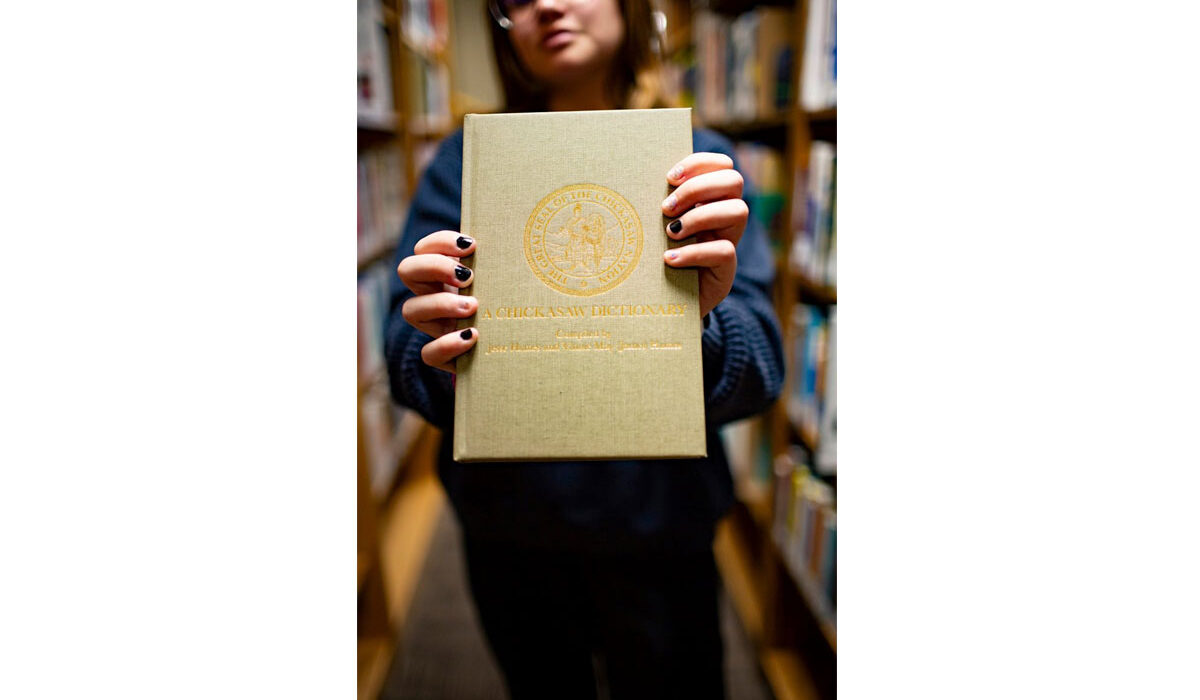Chickasaw Nation remains dedicated to language preservation
Chickasaw Nation
Preserving the heritage, culture and language of the Chickasaw Nation is of paramount importance.
Two dynamic Chickasaw women and a circuit preacher turned political organizer and activist took steps to ensure the language is available to all through a dictionary and compendium two-volume effort where the language will live in perpetuity.
All are members of the Chickasaw Hall of Fame, the highest honor the tribe can bestow on tribal citizens.
The women – Catherine Willmond and Vinnie May Humes – completed three books which remain the building blocks necessary for introduction to the Chickasaw language and ultimate success at speaking it.
Humes’ husband, Rev. Jess Humes, assisted his wife in completing the first draft of “The Chickasaw Dictionary.” For 2.5 years in the early 1960s, the Humes piled their kitchen table with English dictionaries, pen, paper and later a typewriter, to translate words into Chickasaw.
Their effort was at the behest of Humes’ son, Overton James, who served at the time as Governor of the Chickasaw Nation.
Rev. Humes, a fluent speaker of Chickasaw, Choctaw and English, was very aware of the importance of his cultural heritage and worked to compile “A Chickasaw Dictionary” but died in 1966 just as the first draft was completed.
His wife soldiered on with the task to finish it following his death.
Published in 1973, the book was one of the first efforts to preserve the Chickasaw language in printed form.
Rev. Humes was also highly active in political matters, acting at one time as an advisor to Chickasaw Nation Governor Douglas Johnston. He also represented the tribe for many years in Washington, D.C., and worked to reestablish the governorship as a position elected by the Chickasaw people. He was born in 1887 and inducted into the Chickasaw Hall of Fame posthumously in 1996.
He was a Methodist minister for 34 years, riding on horseback from town to town to tend his flock. He and Vinne Mae Humes were among the driving force behind the Seeley Chapel movement advocating for tribal autonomy.
Vinne Mae Humes was self-educated and did not earn her GED until she was 70. She was born in 1903, inducted into the Chickasaw Hall of Fame in 1991 and died in 1996.
Willmond completed two books. “Chikashshanompaat Holisso Toba’chi, Chickasaw: An Analytical Dictionary” was published in 1994, and “Let’s Speak Chickasaw: Chikashshanompa’ Kilanompoli’,” followed in 2009.
Born March 9, 1922, near McMillan, Oklahoma, Willmond only completed third grade before daily tasks on the family farm ended her formal education. Despite understanding little English for the entirety of her life, her dedication to preserving the Chickasaw language spanned decades.
Ironically, the 1956 federal Indian Relocation Act, designed to assimilate and absorb First American citizens into mainstream American culture – an effort to eliminate First American tribes and their heritage – led to Willmond’s moving to California and introduction to Dr. Pam Munro, a University of California Los Angeles (UCLA) linguist.
Together, they produced the two Chickasaw language books. Willmond worked with Dr. Munro to record more than 40 Chickasaw fluent speakers to complete the dictionary.
Willmond taught linguistics classes at UCLA. She also made guest appearances in First American studies classes at UCLA and addressed audiences at Pomona College and University of New Mexico. Willmond and Dr. Munro completed a book about teaching grammar of the Chickasaw language which was accepted for publication by the University of Oklahoma Press.
Willmond was inducted into the Chickasaw Hall of Fame in 2006. She died Feb. 27, 2022, 10 days shy of her 100th birthday.
Today, many resources are available to Chickasaw citizens to learn, speak and carry on the language that is so vital to Chickasaw heritage.
The Humes and Willmond books are available through Chickasaw Press, Amazon and University of Oklahoma Press.
Additionally, Rosetta Stone Chickasaw is available at no cost to Chickasaw citizens and employees. The learning tool is also available to the general public at a reduced rate. Four Rosetta Stone Chickasaw learning lessons are available, and expansion of the lessons is an on-going goal of the Chickasaw Nation.
The Chickasaw Nation Language Preservation Division is enjoying immense success with other programs aimed at preserving the language.
The Chikasha Academy Adult Immersion Program (CAAIP) is a full-time, 40 hours per week, three-year commitment by students to become conversational speakers. The program is dedicated to creating new Chickasaw language teachers.
CAAIP is an adult Chickasaw language immersion program for novice learners who are paired with master-level fluent Chickasaw speakers and proficient second language speakers of Chickasaw.
Upon completion, participants are expected to be, at minimum, conversational in Chickasaw in the intermediate mid category, as defined by the American Council on the Teaching of Foreign Languages’ standards.
Additionally, a committee of fluent Chickasaw speakers meets regularly to promote the language and revamp it for use in the 21st century.


